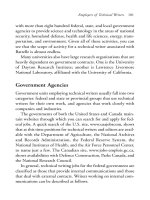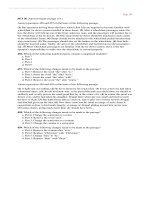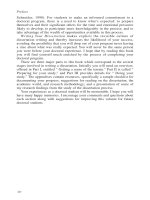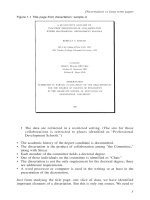Writing your doctoral dissertation - part 12 ppt
Bạn đang xem bản rút gọn của tài liệu. Xem và tải ngay bản đầy đủ của tài liệu tại đây (42.96 KB, 5 trang )
Forming your dissertation committee
52
of unpublished work in progress, as well as important published resources.
You will need to respect the knowledge of your chair, who is likely to
criticize your work, requiring you to revise texts, for example. You will
need to value and feel comfortable with the way in which feedback and
criticism are provided.
• Time to work with you as you progress. Since faculty are fairly independent
in scheduling appointments, you will need to identify faculty who will make
time in their schedules to work with you. A related element is the university
status of the faculty. Whereas untenured faculty contracts may not be renewed,
tenured faculty are likely to be more stable. Faculty who leave one institution
frequently elect to continue working with their doctoral students, but these
arrangements get to be more complex. Sabbatical leaves also potentially
interrupt progress. You will need to consider the relative stability and
accessibility of faculty along with your own time constraints and projections.
• Success at bringing students to graduation. Since you are concerned with
completing your degree, you will want to work with someone who has a
fairly consistent record of success with students finishing their
dissertations. Some students seek to be connected with the “stars” in the
department, with people who are well-known internationally. Star-status,
however, may contribute to students’ difficulty in meeting “standards,” or
in finding time to meet with them when they are on the conference circuit.
On the other hand, their national status might facilitate inclusion at
prestigious professional conferences.
• Nurturing students in the academic tradition. The professor must be
comfortable in initially leading, but eventually freeing, students to become
independent researchers. At first, the student is dependent on the chair and
the committee, but eventually the student should be perceived as an expert
and a colleague. If the professor is a confidence-booster for the student,
the student may find it easier to progress.
• Personal preference. Some students prefer to work with female faculty,
while others prefer to work with male faculty. Some prefer older people,
while others younger.
It is unlikely that you will find all the characteristics of the perfect mentor in
one person. You will need to identify the one or two characteristics that you
consider to be essential for the person who will guide your apprenticeship. It
is likely that other members of your committee will be able to offer different
strengths which “round out” your committee. You certainly want your
committee to be supportive of your progress.
Selecting the Chair of Your Dissertation Committee
Each student selects the dissertation chair. You will discover a subtle process
in which faculty implicitly or explicitly make known an interest in working
with you. As a way of indicating interest in serving as the chair of your
Forming your dissertation committee
53
committee, a faculty member may inquire who your dissertation chair is. If
you respond that you do not have one yet, they may volunteer to fill that
void. If you indicate that you are not sure what your topic is yet, they may
seek to engage you in conversation to guide that selection.
The fact that a faculty member has engaged you in this discussion suggests
a respect for the quality of your academic work. If no one has approached
you, however, that is not a reason to be depressed. Perhaps they are unaware
of how far you have progressed in your program, or perhaps they think you
have already selected your chair. You may need to initiate the conversation
and the process. (If a faculty member approaches you, you need not think
that person is your only opportunity. Try to be in charge of this process
without conveying a sense of arrogance. You may talk with many faculty,
letting each know you are exploring topics, gathering information before
deciding on your committee at this moment.)
Students sometimes approach a faculty member. They may ask the
professor if she or he has time to take on another doctoral student. It is useful
to have a draft of an idea, or to request time to talk about possible areas of
research. It is important to let the professor know where you are in the
process of working on your dissertation.
You probably do not want to ask a professor blithely to accept such a
crucial role in your doctoral program without knowing more about how
successfully the two of you can work together. So you might be wise to
indicate that you are in the process of thinking about a topic and want
additional insights. Along with sharing perspectives on your proposed
research problem, you will get a sense of how you may work with this
individual on a long-term basis. Along with your personal interactions with
different professors, use as much “insider information” as you can: ask other
doctoral students about their experiences and knowledge of different people;
and read dissertations they have sponsored. Remember to access multiple data
sources, not limiting yourself to one perspective. It is reassuring to have
confirming information on the inferences you are drawing from your
inquiries. (Never under-estimate the power of the university gossip mill. Get
information you can trust.)
Faculty may make themselves hard to find to avoid giving an explicit “turn
down.” Given the voluntary nature of chairing a dissertation committee, faculty
typically elect to work with the candidates they perceive to be the strongest
academically and the easiest to work with. Students who demonstrate these
characteristics in their coursework are frequently sought after by faculty.
In the process of considering your options from among your program
faculty, you will want to identify as clearly as you can what your hopes are
in working with a faculty member as the chair of your dissertation committee.
Some issues you might consider include:
• Do you have confidence that Professor X can help/guide you?
• Are you ready to accept direction and criticism from Professor X?
• Are you willing to adapt to Professor X’s interaction style?
Forming your dissertation committee
54
You need to identify the best match between your learning style and the faculty
who are available to work with you. Be open-minded in your exploration.
Sometimes faculty are different in one-to-one relationships than they are in
lectures or seminar classes. In your exploration you may find a professor working
on a project that interests you. This might be a combination made in heaven.
Consider it carefully. For each student the response is probably different. (Some
like to be told exactly what to do, while others want to learn how to think on
their own.) Selecting your committee is not easy but it is essential for you to
progress. Do not expect perfection. There probably is no such thing as a perfect
committee—or a perfect doctoral student for that matter!
In this process of selecting the members of your committee you want to be
cautious of offending others in the department, those who will be your professional
colleagues once you graduate and/or those who may ultimately participate in the
process of evaluating your dissertation. You never know which committee members
will need to be replaced, which colleagues will participate in your oral defense as
“outside readers,” or which will be in positions to derail your progress.
You want to keep everyone’s friendship and respect. This requires very
careful planning. Keep your eye on your goal and avoid participation in any
intrigues or gossip which may place you in one political camp or another.
(Although you may have been oblivious to the political nature of the
academic world as you work with them in a group, you are likely to become
increasingly cognizant of the internal frictions and even wars which prevail
in most departments. Several fascinating books on this topic are included in
Appendix C.) As a doctoral student you are well advised to remove yourself
from internal political discussions. Make it very clear to yourself and the
faculty in your department that you do not want to become involved. You
want to get done! You have an agenda that keeps you very busy, and there’s
no time in your calendar for gossiping or for politics.
While it will be inevitable that some faculty might feel rejected because
you have not asked them to chair your committee, you may still maintain a
professional relationship, inquiring about their work and acknowledging how
their courses helped in your dissertation work. At all times convey a sense of
respect for all, while progressing on your own work. Expect to have tense
times, but also expect to find ways to work through these. Most people have.
Selecting the Readers on Your Doctoral Committee
The readers on your committee work with your chair to promote your
progress. They may work with you at other times than your chair, drawing
on different areas of strength. Some may only read drafts which have been
approved by your chair. They may offer recommendations which need to be
considered in collaboration with your chair. Your chair is the leader in this
process, so make sure you follow your chair’s advice on how to proceed at
all times. Ultimately, your readers and your chair must approve your
dissertation proposal, and eventually your dissertation.
Forming your dissertation committee
55
Working in collaboration with your chair, you will select appropriate
readers. You will want faculty who can work well together, and your chair
will be in the best position to determine these collegial relationships. You may
offer some suggestions, but you should allow your chair to guide you in this
decision. The committee will stay with you, guiding your apprenticeship. In
some institutions this committee evolves during the writing of the proposal
as the needed expertise becomes evident. In other institutions, the committee
may grow from the time of the proposal to the completed dissertation. Find
out what the process is at your university.
You will talk with the members of your committee as you develop your
dissertation proposal, as you conduct your research, and as you write your
dissertation. We will address these relationships in the next chapter.
56
7 Roles and Responsibilities of
Dissertation Committees
Be determined. Set your goal. Save the money (at least as much as you can);
get a supportive mentor who is knowledgeable with your topic. Go for it.
Finish. Don’t stay ABD.
I was wiser than I thought.
The formal establishment of your committee usually happens simultaneously
with the university’s official approval of your proposed dissertation research.
(This document is typically called your “dissertation proposal.”) In the time
between completing your courses and having an approved dissertation
proposal you will work with faculty who are likely to become the officially
designated committee. You may consider them your “unofficial” or your
“proposed” committee for the time being. But they are not yet your official
committee. There are no temporary titles which are generally used around
the university, so we will use the terms “chair” and “reader,” understanding
that these are potential roles and titles which may change in the process of
developing your dissertation proposal.
During the time when you are drafting your dissertation proposal you may
consult with a large number of professors. This process is both a testing
ground for your ability to work well as a committee and the beginning of the
road to writing your dissertation. Once the chair and readers have agreed that
your dissertation proposal is done, they initiate a process within the
university, simultaneously accomplishing two important official steps:
• appointing your dissertation committee; and
• accepting your dissertation proposal.
Because the writing of the dissertation proposal includes the development and
refinement of the research focus, there are likely to be revisions in your
thinking and in the thinking of the faculty who are considering working with
you on your dissertation. You are also likely to find that some faculty, who
might have the expertise, do not make time to talk with you. Simultaneously
you will find others who are both more responsive and have the expertise to
contribute to your proposal. The proposal writing time, then, is a time for the
student to consult with faculty as potential committee members, and for the









